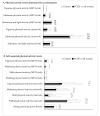Dietary and Physical Activity Behaviors in Women with Polycystic Ovary Syndrome per the New International Evidence-Based Guideline
- PMID: 31717369
- PMCID: PMC6893689
- DOI: 10.3390/nu11112711
Dietary and Physical Activity Behaviors in Women with Polycystic Ovary Syndrome per the New International Evidence-Based Guideline
Abstract
Lifestyle modifications are recommended as first-line therapy in polycystic ovary syndrome (PCOS). However, usual dietary and physical activity (PA) behaviors of women with PCOS remain uncertain, likely owing to controversy in diagnostic criteria. Our objective was to contrast the usual dietary and PA behaviors of women with PCOS (n = 80) diagnosed by the 2018 International Evidence-based Guideline for the Assessment and Management of PCOS to that of controls (n = 44). Study outcomes were dietary intake, diet quality (Healthy Eating Index-2015), and PA (questionnaire, waist-worn accelerometers). Women with PCOS met the acceptable macronutrient distribution ranges for carbohydrate, fat, and protein, but did not meet the recommended dietary reference intakes for vitamin D (mean (95% confidence interval); 6 (5-7) μg/d), vitamin B9 (275 (252-298) μg/d), total fiber (24 (22-26) g/d), or sodium (4.0 (3.6-4.4) g/d). Women with PCOS also met the US recommendations for PA. No differences were detected in dietary intake, diet quality, or PA levels between groups (p ≥ 0.11). In conclusion, women with and without PCOS have comparable dietary and PA behaviors. A lack of unique targets for dietary or PA interventions supports the position of the new guideline to foster healthy lifestyle recommendations for the management of PCOS.
Keywords: diet; exercise; healthy lifestyle; nutritional assessment; polycystic ovary syndrome.
Conflict of interest statement
The authors declare no conflict of interest.
Figures

References
-
- Teede H.J., Misso M.L., Costello M.F., Dokras A., Laven J., Moran L., Piltonen T., Norman R.J. Recommendations from the international evidence-based guideline for the assessment and management of polycystic ovary syndrome. Hum. Reprod. 2018;33:1602–1618. doi: 10.1093/humrep/dey256. - DOI - PMC - PubMed
-
- Kazemi M., McBreairty L.E., Zello G.A., Pierson R.A., Gordon J.J., Serrao S.B., Chilibeck P.D., Chizen D.R. A pulse-based diet and the Therapeutic Lifestyle Changes diet in combination with health counseling and exercise improve health-related quality of life in women with polycystic ovary syndrome: Secondary analysis of a randomized controlled trial. J. Psychosom. Obstet. Gynaecol. 2019;27:1–10. doi: 10.1080/0167482X.2019.1666820. - DOI - PubMed
Publication types
MeSH terms
Grants and funding
LinkOut - more resources
Full Text Sources
Medical
Miscellaneous

